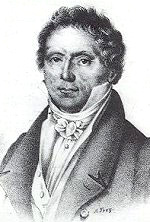| |
 |
| |
 Anton Reicha was born on February 26th 1770 in Prague. Before his first birthday he lost his father, Simon. From the age of ten, he lived with his uncle Josef Reicha, a prominent cellist and composer at the court of the Öttingen-Wallersteins at Castle Harburg near Ansbach. In 1785, Josef Reicha and his family moved to the Court of the Elector of Cologne in Bonn where Josef took up the prestigious appointment of Kapellmeister (the Elector Maximilian Franz Habsburg was the brother of the Holy Roman Emperor, Joseph II.) Antonín was given the second flute position in his uncle's orchestra, where he met Ludwig van Beethoven (who sat at the back of the viola section) with whom he became lifelong friends. Anton Reicha was born on February 26th 1770 in Prague. Before his first birthday he lost his father, Simon. From the age of ten, he lived with his uncle Josef Reicha, a prominent cellist and composer at the court of the Öttingen-Wallersteins at Castle Harburg near Ansbach. In 1785, Josef Reicha and his family moved to the Court of the Elector of Cologne in Bonn where Josef took up the prestigious appointment of Kapellmeister (the Elector Maximilian Franz Habsburg was the brother of the Holy Roman Emperor, Joseph II.) Antonín was given the second flute position in his uncle's orchestra, where he met Ludwig van Beethoven (who sat at the back of the viola section) with whom he became lifelong friends. Following the French invasion of Bonn in 1794, Anton moved to Hamburg. Here he teached the piano, harmony and composition, while composing and studying himself. In 1799 he tried his luck with his operas in Paris and in 1801 he moved on to Vienna. Here he went to visit Haydn, with whom he formed a close friendship. He renewed his friendship with Beethoven and took lessons from Albrechtsberger and Salieri. It was there that he read mathematics and philosophy and began to reflect seriously upon pedagogy. Giacomo Meyerbeer, Robert Schumann and Bedrich Smetana are all known to been influenced by Reicha's treatises. In 1808 he was back in Paris. Despite still not being very succesful with his operas, his fame was rising. Reicha was appointed professor of counterpoint and fugue at the Conservatoire in 1818. The year he married Virginie Enaust, with whom he had two daughters. Although not the first to compose for the wind quintet, was undeniably the man responsible for its unique popularity during the early years of the nineteenth century. He became one of the Paris Conservatoire's most respected professors. Among his students were Franz Liszt, Hector Berlioz, Henri Brod (oboe virtuoso and composer), Georges Onslow, Charles Gounod, Louise Farrenc (the first woman to be appointed professor of piano at the Paris Conservatoire) and Cesar Franck. He taught several generations of composers who responded to his massive output (he composed at least 28 wind quintets during his lifetime) by adding to the repertoire themselves. In 1801 he traveled to Vienna, where he was reunited with his friends Beethoven and Haydn. During his stay, Reicha came under the influence of the Mannheim School, and also that of Gluck, Haydn, and Mozart. He studied with both Albrechtsberger and Salieri. By 1808 Reicha had moved permanently to Paris where he remained until his death. Reicha's great cycle of 24 quintets were written for five professors at the Paris Conservatoire - all outstanding musicians, renowned for their virtuosity. Reicha obviously had a high level of performance in mind when writing his quintets, which are amongst the most difficult pieces in the early repertoire. The 24 published wind quintets were composed between the years 1811 and 1820. In 1815 a group was formed for the singular purpose of performing Reicha's Quintets at a series of subscription concerts. These were held in the foyer of the Théâtre Italien until 1819. These concerts were massively popular, they attracted a cult following and created a sensation; the whole of Parisian society longed to be at the first performances of the newest Reicha quintet. Reicha held a place of great honor in French society. He was welcome in the most important artistic and literary salons, and contemporary French novelists mention the performance of Reicha's wind quintets in their books. As a composer Reicha was obsessed with fugue, especially double fugue. He preferred to work with old-fashioned forms, but pushed them to their very limits; he layered polytonality, polyrhythm and the leitmotiv over the musical forms of the previous century, combining eastern European folk melodies with eighteenth century hardcore counterpoint on a symphonic scale to produce something very modern, a phenomenon which grabbed the attention of the Parisian public as well as that of its aspiring composers. Reichas two most famous students Liszt and Berlioz, studied with him from 1826. And in 1831 he was made a Chevalier of the Légion d'honneur. Reicha died in Paris on May 28th 1836. |
| Gurn Blanston |
|
|
 |
|
|||||||||||||||||||